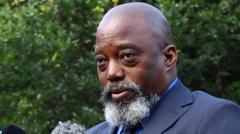Former President of the Democratic Republic of Congo, Joseph Kabila, has returned to the country after two years in self-imposed exile, prompting debate over his reported connections to rebel forces and the implications for the current political climate.
Ex-DR Congo President Joseph Kabila Returns Amid Ongoing Conflict

Ex-DR Congo President Joseph Kabila Returns Amid Ongoing Conflict
Joseph Kabila's return to DR Congo raises questions regarding his alleged ties to rebels and the current government's stability.
Joseph Kabila, who governed the Democratic Republic of Congo (DRC) from 2001 to 2019, has made headlines with his recent return to the eastern city of Goma, claiming to address ongoing conflicts in the region. His visit comes in the wake of a controversial decision by the DRC Senate that stripped him of his immunity amid allegations of aiding the Rwanda-backed M23 rebel group, which has been engaged in armed conflict with the Congolese military.
Kabila's spokesperson and a youth leader from his political party, the People's Party for Reconstruction and Democracy (PPRD), confirmed his arrival while praising it as a "homecoming." Innocent Mirimo, the youth leader, expressed sentiments that Kabila should receive unrestricted access to the country, likening his return to a father coming back to his children.
However, Kabila has faced severe criticism from the current government led by President Félix Tshisekedi, with authorities accusing him of war crimes and treason, citing a "substantial body of documents" linking him to the M23 group. For his part, Kabila has repeatedly denied any involvement with the rebels while condemning the DRC justice system as politically manipulated.
The implications of Kabila's return are manifold, especially given the backdrop of ongoing conflict in the region. The M23 group, which initially disbanded after a peace agreement in 2013, resumed hostilities in 2021, alleging that DRC authorities failed to uphold the deal. Their resurgence has resulted in significant advances in the eastern DRC, notably capturing Goma earlier this year, leading to widespread civilian displacement.
Kabila had resided in South Africa during his exile but has expressed intentions to return to his homeland to assist in navigating the crisis. He has made statements characterizing the DRC government as a dictatorship and highlighting a perceived decline in democratic freedoms.
The current administration dismissed Kabila's remarks, with government spokesperson Patrick Muyaya stating that the former leader has "nothing to offer the country." The political tensions surrounding Kabila's return, coupled with the humanitarian crises due to ongoing fighting, present a complex landscape for DRC's future governance and stability.




















